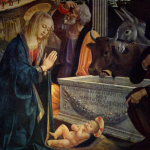Was Jesus a Roman Fiction?
by Jimmy Akin
Filed under Historicity

Computer scientist and self-proclaimed biblical scholar Joseph Atwill is going to be giving a presentation in England that is stirring up some buzz.
Recently, Atwill sent out a press release that was picked up by outlets such as The Daily Mail.
According to the press release, Atwill is planning to explain his theory that Jesus Christ never lived.
Atwill is a mythicist—a person who claims that Jesus is a myth, not a historical figure.
According to Atwill’s version of mythicism, Jesus is a fictional character that was invented by the Roman emperor(s) and the circle around them.
How well does his claim stand up to scrutiny?
Setting the Context
The position of mythicism is extremely uncommon among historians and Bible scholars. Virtually all—including those who are not Christian—acknowledge that the historical evidence indicates that Jesus was a real, historical figure.
In a previous post, we’ve looked at some of that evidence.
Just looking at early non-Christian sources, we have clear evidence that the Christian movement began in the first half of the first century A.D. in the Roman province of Judaea, and, by the end of the first century, had spread widely in the Roman world.
These are facts admitted by both early Christian and non-Christian sources alike.
The movement's sudden appearance and rapid spread indicate that it was highly organized and motivated to spread its message—facts that in turn point to the existence of a founder who gave the movement its organization and mission.
The earliest sources we have that address who that founder was (that is to say, the New Testament documents), indicate that it was Jesus of Nazareth.
This was the movement’s own account of its founding, and this must be regarded as the most reasonable explanation unless there is compelling evidence otherwise.
Does Atwill have such evidence?
Revealing Statements
In his book Caesar’s Messiah: The Roman Conspiracy to Invent Jesus (Flavian Signature Edition), Atwill frames his case with some revealing remarks.
He states:
"This imperial family, the Flavians, created Christianity, and, even more incredibly, they incorporated a skillful satire of the Jews in the Gospels and Wars of the Jews to inform posterity of this fact.
The Flavian dynasty lasted from 69 to 96 C.E., the period when most scholars believe the Gospels were written. It consisted of three Caesars: Vespasian and his two sons, Titus and Domitian.
Flavius Josephus, the adopted member of the family who wrote Wars of the Jews, was their official historian.
The satire they created is difficult to see. If it were otherwise, it would not have remained unnoticed for two millennia. . . .
[W]hy then has the satirical relationship between Jesus and Titus not been noticed before? This question is especially apt in light of the fact that the works that reveal their satire—the New Testament and the histories of Josephus—are perhaps the most scrutinized books in literature.
Moreover, the satirical level of the Gospels has not been discovered because it was designed to be difficult to see.
The Flavian Caesars wanted more than just to transform messianic Judaism. They wanted Christianity to flourish and become widely held, even world-wide, before the Gospels’ satirical level was discovered."
So let’s be clear on what Atwill is claiming: The Flavian Caesars invented Christianity, but they did so in a way that incorporated a satire both in the Gospels and in the writings of the Jewish historian Josephus.
They incorporated this satire to reveal the falsehood, so that future generations could admire their cleverness.
Yet this satire was “designed to be difficult to see” because “they wanted Christianity to flourish and become widely held, even world wide.”
Thus they disguised this satire so cleverly that it would not be recognized for 2,000 years, even though—as Atwill states—the New Testament and the histories of Josephus “are perhaps the most scrutinized books in literature.”
Really?
More than “Too Clever by Half”
This claim is more than “too clever by half.” It’s too clever by several orders of magnitude.
Nobody is going to invent a fake religion and then plant in it a satire that reveals what they are doing, trusting that they have disguised the satire sufficiently that it will let the religion become widespread, or even world-wide, and then expect it to be discovered in future generations.
Even if they tried that, the satire would never remain undiscovered for 2,000 years—in “perhaps the most scrutinized books in literature”—until an obscure computer scientist figures it all out two millennia later.
Simply looking at this set of remarks reveals that the vastly greater likelihood is that the supposed satire is in the computer scientist’s imagination—and that the scholars who scrutinized the texts for 2,000 years and didn’t see the satire were reading them right.
An Example
Just to give you a taste of the kind of thing that Atwill sees as evidence of satire, let’s consider one of the key “parallels” that he cites as evidence for the satire.
In a famous passage in Wars of the Jews (6:3:4), Josephus reports that at one point during the siege of Jerusalem the lack of food was so great that an upper-class woman roasted and ate half of her infant son.
The aroma attracted attention, and some of the rebels in the city came to her and demanded her food.
She then offered them what was left, and they went away, horrified, as she sarcastically berated them for causing the calamity that had come upon the city.
Oh, and this woman’s name was Mary (daughter of Eleazar of Bethezub).
And all of this is depicted as occurring more than three decades after the life of Christ.
Despite that, and despite the fact that Mary was the single most common female name in Palestinian Judaism at the time (so that there are six or seven Marys in the New Testament alone), Atwill takes this account as evidence of Roman satire:
- For Mary of Eleazar, read the Virgin Mary
- For the unnamed, roasted son, read Jesus
- For the eating, read the Eucharist
The connections are exceedingly tenuous, to say the least. In his book, Atwill cites several more, equally tenuous connections, but they do not change the fact that the alternative explanation is far more likely: That Josephus is not parodying the Eucharist but reporting an incident that actually took place during the siege of Jerusalem after the rebel leader John of Gischala burned the city’s grain supply and doomed it to famine (5:1:4).
Unfortunately, this kind of parallelomania is common in Atwill’s writing. He regularly cherry-picks Josephus for wildly improbable allusions to the New Testament, at times using his own, idiosyncratic translations of terms.
Frankly put, this is not scholarship.
What Motive?
Taking a step back from the level of detail, let’s consider some of the larger problems with Atwill’s claim.
For a start, why would the Romans do this? What motive would they plausibly have had?
According to Atwill, the Gospels were most likely written between A.D. 71 and 79, during the reign of the Emperor Vespasian.
Vespasian and his son Titus had just fought the First Jewish War (A.D. 66-73) to put down revolutionaries in Judaea, and they wanted to forestall similar incidents in the future.
They thus wanted to create a pacifistic version of Judaism that would accept Roman rule.
There are several problems with this.
The Roman Way
First, creating elaborate literary hoaxes to develop pacifistic strains of foreign religions wasn’t the Roman way of doing things.
The Roman way of doing things involved armies and assassinations, not literary hoaxes. They were, after all, Romans, not Cardassians.
Then there is the factor of time: It would take decades or centuries to create a movement that could pacify Judaism, and the Roman emperors simply did not think that long-term.
They were far more focused on surviving their own reigns, and they wanted problems dealt with expeditiously.
For them, the sword was far more powerful—and quicker—than the pen.
Jews Willing to Accept Roman Rule
Second, creating a literary hoax so that Jews would be willing to accept Roman rule would have been completely unnecessary.
There already were Jews willing to accept Roman rule. Loads of them.
And since the revolutionaries had largely been killed off, those willing to accept the Roman rule were now clearly in the majority.
There were even movements within the Jewish community—such as the Sadducees—who were known for being Roman collaborators.
If you wanted to pacify the Jewish community, fostering such existing movements—not spawning a literary hoax to create a new one—would have been far more logical.
Who Has Heard Our Message?
Third, just who was going to be pacified through the new Christian movement?
The revolutionaries, such as the Zealots and the Sicarii, would be the last people interested in a pacifistic version of Judaism.
Anyone preaching cooperation with the Romans would find their message falling on deaf ears when it came to the Zealots and Sicarii.
The only people likely to respond to the message would be the very people who don’t need convincing.
No Position to Rebel
Fourth, Judaea was in no position to rebel after the war finished.
It had been ravaged, its economic and military power destroyed, and its population disorganized, scattered, or killed.
It would take decades of rebuilding before Judaea could think about rebelling again, and when the next rebellion came (the Kitos War of A.D. 115-117) it started outside Judaea, in lands that had not been crushed in the first war.
What Vespasian Actually Did
Fifth, we know what the Vespasian actually did to deal with the Jewish community.
Rather than creating a fake religion, he taxed them.
Vespasian imposed a punitive tax on the Jewish people and, just to add an additional element of humiliation now that their temple was destroyed, he had the money directed to the Temple of Jupiter Best and Greatest in Rome.
His approach was thus to humiliate the Jews through temporal means, not to convert them to a new, pacifistic religion.
Problems with Writing
Another set of problems with Atwill’s claim (beside the issue of motive) are of a practical nature.
For a start, how did he and the circle around him come up with the documents of the New Testament?
They weren’t Jews. They weren’t immersed in the Jewish Scriptures the way the authors of the New Testament clearly were.
It would not have been possible for pagan Romans to write the New Testament. They would have had to have Jewish help.
Indeed, the New Testament documents had to have been produced by individuals intimately familiar with Jewish thought, culture, and language.
So did they employ Jewish writers to do this for them? Why would the Jewish authors have collaborated on a project this blasphemous?
Many Jews would have been willing to die rather than do so.
Planting Secret Messages
Even if they found some who could be forced into doing so, these Jews would have been far more likely to slip in “This is all fake” messages into the texts rather than the elaborate satire Atwill claims is there.
And are we really to believe that the authors' Roman masters were so interested in planting the satire that they were willing to closely superintend the writing and say, “Hey, we need more satire here. Dig through your memory of Jewish lore to come up with something offensive and biting.”
The Role of Josephus
Further, if Josephus himself were one of the authors involved in this conspiracy, and if his writings are meant to form a companion to the New Testament, why didn’t he say more about Jesus in his writings?
He barely mentions Jesus twice.
If Josephus was seeking to plant information to foster Vespasian’s Christ conspiracy, why didn’t he do so in a clear and direct way in Jewish War and Antiquities of the Jews (not to mention his Life and Against Apion).
How Will They Hear Without Someone Preaching?
Then there is the practical problem of how the documents of the New Testament were to be distributed.
They couldn’t just leave them in libraries, waiting for the illiterate masses to check them out and start a new religion among the lower class and the slaves.
Religions didn’t get started by literary means.
To effectively spread a faith in the first century would have involved doing exactly what the Gospels present Jesus doing: Starting an organized preaching mission, with evangelists to carry the word to others.
So where, in the A.D. 70s, did Vespasian get a team of Jewish preachers to go out, at risk of damnation, to proclaim a false Christ?
Even if they were charlatans who didn’t believe in actual damnation, why would they be willing to risk persecution and martyrdom at the hands of the local authorities?
These would have been risks for them, because the kinds of riots and divisions we see in the book of Acts would have been precisely what they would face as they preached Jesus among the Jews in different cities.
They would be lucky not to get lynched!
And, if pacifying Judaism was what this was supposed to be all about, why wouldn’t the Romans call the whole enterprise off as soon as they started seeing the kind of uprisings it was provoking in the Jewish communities?
Busted!
There is also the problem of getting their message accepted.
While many people in Judaea had been killed, many survived and were scattered throughout the Roman world.
Many who had lived in Judaea in the A.D. 30s were still around, and when Christian missionaries showed up with a message about Jesus of Nazareth preaching to thousands, they would have been in a position to say, “Hey! There was no such guy! I was there!”
Some might say, “I was in Jerusalem at Passover of A.D. 33, and the events you describe simply did not happen!” or “I’m from Galilee; it’s a tiny place; and there was no such Jesus going about preaching and working miracles.”
Who Has Believed Our Word?
Even without such a witness in a local Jewish community, consider what this enterprise would have involved: Creating—in the A.D. 70s—the illusion of a movement stretching back to the A.D. 30s.
That movement was based in local congregations known as churches, and the New Testament documents report churches being located in major metropolitan areas between A.D. 30 and A.D. 70.
These areas include Jerusalem, Syrian Antioch, Ephesus, Corinth, Rome, Thessalonica, Philippi, and others.
Now: If Christianity was first introduced into these cities some time after A.D. 70, why didn’t the first converts pick up on the fact that there had been no churches in these cities previously?
For example, Ephesus is a major Christian center in Acts. Why didn’t the first actual Christians in Ephesus not notice that there had been no church there previously, though Acts says that there was?
Trying to create the illusion of a previously existing movement would have been fraught with peril and far harder than simply starting one, without claiming an extensive past history for it.
A more logical way to proceed, if you wanted to claim Jesus had lived decades earlier, would be to have a single disciple who knew Jesus but was under orders not to preach him until now.
Making up an elaborate, decades-long backstory for the Church, filled with claims that could easily be falsified, would not be way to go.
Playing with Dynamite
All told, the scheme that Atwill attributes to Vespasian and his circle would seem to have a remarkably remarkably high chance of failure.
One of the missionaries breaking under the pressure of a lynch mob and trying to exculpate himself by pointing to the Emperor would be all it could take to give the plan away.
And if it did fail, the consequences would have been dramatic.
Trying to subvert the Jewish religion is the very kind of thing that would cause a massive Jewish uprising.
If the idea got out that the Romans were trying to get Jews to worship a false Messiah, it would have sparked an empire-wide rebellion that would have been far worse than the Jewish War of the A.D. 60s.
Trying to pull off such a hoax would be playing with dynamite, and the Roman emperors would have been crazy to attempt such a hare-brained scheme.
What Now?
If you like the information I've presented here, you should join my Secret Information Club.
If you're not familiar with it, the Secret Information Club is a free service that I operate by email.
I send out information on a variety of fascinating topics connected with the Catholic faith.
In fact, the very first thing you’ll get if you sign up is information about what Pope Benedict said about the book of Revelation.
He had a lot of interesting things to say!
If you’d like to find out what they are, just sign up at www.SecretInfoClub.com or use this handy sign-up form:
Just email me at jimmy@secretinfoclub.com if you have any difficulty.
In the meantime, what do you think?
Related Posts
Note: Our goal is to cultivate serious and respectful dialogue. While it's OK to disagree—even encouraged!—any snarky, offensive, or off-topic comments will be deleted. Before commenting please read the Commenting Rules and Tips. If you're having trouble commenting, read the Commenting Instructions.











